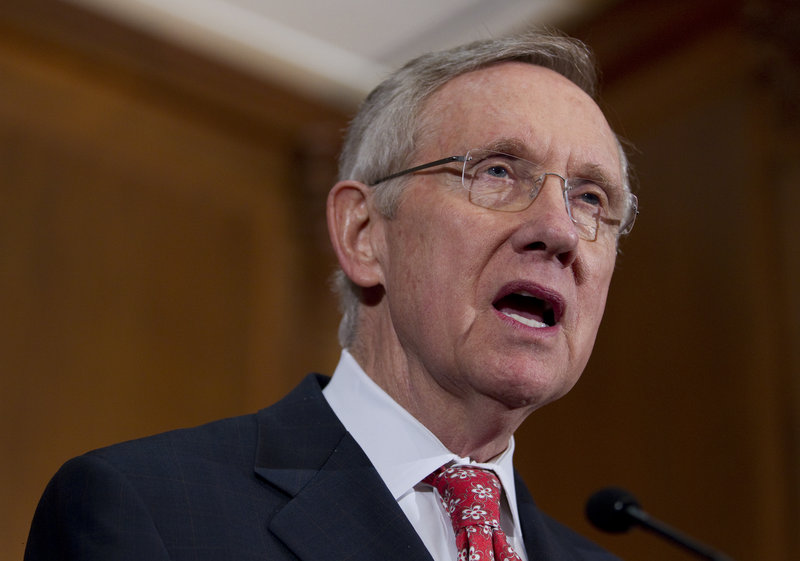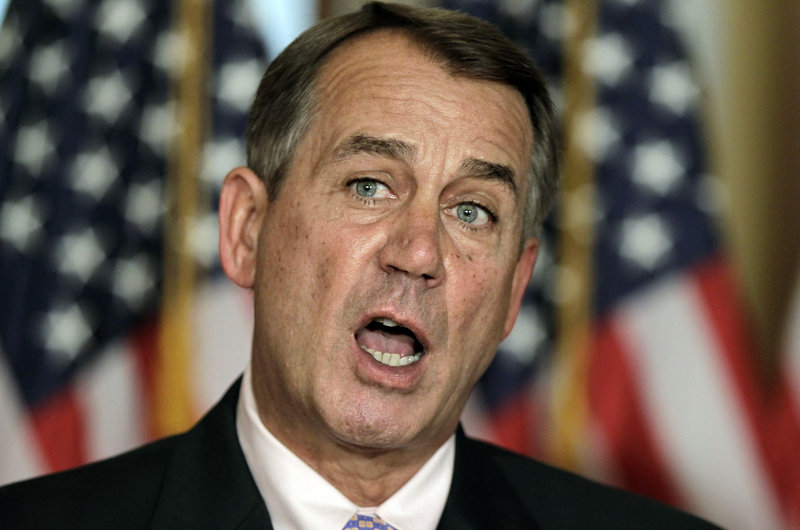WASHINGTON — In a last-minute stab at compromise, Republican congressional leaders and the White House made significant progress Saturday toward a deal to avert a government default threatened for early this week, according to officials familiar with the talks.
Under the plan, the nation’s debt limit would rise in two steps by about $2.4 trillion and spending would be cut by a slightly larger amount, these officials said. The first stage – about $1 trillion – would take place immediately and the second later in the year.
Congress would be required to vote on a balanced budget amendment to the Constitution, but none of the debt limit increase would be contingent on its approval.
One official said the two sides had settled on general concepts, but added there were numerous details to be worked out, and no assurance of a final agreement.
Still, word of significant progress after weeks of stalemate offered the strongest indication yet that an economy-crippling default might be averted.
“There are many elements to be finalized…there is still a distance to go,” Majority Leader Harry Reid cautioned in dramatic late-night remarks on the Senate floor.
Reid said that at the request of White House officials, he was postponing a test vote set for shortly after midnight on his own legislation to raise the debt limit while cutting spending. Republicans opposed the bill, and said they had the votes to block its advance.
“We are now fully engaged, the speaker and I, with the one person in America out of 307 million people who can sign a bill into law,” Senate Republican leader Mitch McConnell said earlier in the day at a joint news conference with House Speaker John Boehner. “I’m confident and optimistic that we’re going to get an agreement in the very near future and resolve this crisis in the best interests of the American people.”
Without legislation in place by Tuesday, administration officials say the Treasury will run out of funds to pay all the nation’s bills. They say a subsequent default could prove catastrophic for the U.S. economy and send shockwaves around the world.
President Obama is seeking legislation to raise the government’s $14.3 trillion debt limit by about $2.4 trillion, enough to tide the Treasury over until after the 2012 elections. Over many weeks, he has agreed to Republican demands that deficits be cut – without a requirement for tax increases – in exchange for additional U.S. borrowing authority.
But Obama has threatened to veto legislation that would require a second vote in Congress for any additional borrowing authority to take effect, saying that would invite a recurrence of the current crisis in the heat of next year’s election campaigns.
On Saturday, House Republican leaders engineered a vote to defeat a Reid-drafted proposal to raise the debt limit on a near-party line vote at mid-afternoon. Republicans stood ready to block the same measure’s advance in the Senate.
Reid accused Republicans of filibustering, and it appeared he was hoping to find enough defectors in the GOP ranks so he could overcome the blockade. Indeed, some Republicans expressed concerns about the effects of gridlock.
“I’m worried about Congress defaulting on our country,” said Sen. Johnny Isakson, R-Ga. He suggested terms of a possible compromise and urged fellow lawmakers to find common ground.
With financial markets closed for the weekend, lawmakers had a little breathing room, but not much. Asian markets begin opening for the new work week late this afternoon in the capital.
At the news conference, McConnell said Obama “needs to indicate what he will sign, and we are in those discussions.”
He said later he had spoken several times during the day with Vice President Joe Biden, who played a prominent role in earlier attempts to break the gridlock that has pushed the country to the verge of an unprecedented default.
Boehner said that despite the partisanship of recent weeks, “I think we’re dealing with reasonable, responsible people who want this crisis to end as quickly as possible and I’m confident it will.”
To get to the endgame, Republicans and Democrats had to go through the formality of killing each other’s bills – scoring their own political points – before they could turn to meaningful negotiations.
The House voted down legislation drafted by Democrat Reid to raise the government’s debt limit by $2.4 trillion and cut spending by the same amount. The vote was 246-173, mostly along party lines and after debate filled with harsh, partisan remarks.
Republicans said the Reid spending-cuts plan was filled with gimmicks and would make unacceptable reductions in Pentagon accounts.
“It offers no real solutions to the out-of-control spending problems,” said Rep. Alan Nunnelee of Mississippi, part of a group of 87 first-term Republicans who have led the push for deeper spending cuts.
Not even Democrats seemed to like the legislation very much, although many emerged from a closed-door meeting of the rank and file saying they would vote for it.
Rep. Lloyd Doggett, D-Texas, called it “the least worst alternative to avoid default.”
Yet with their votes, many Democrats signaled their readiness for compromise by voting to cut spending without raising taxes. Many Republicans insist taxes must not be raised to cut into federal deficits, even for the wealthiest Americans and for big oil companies.
In remarks on the House floor, Rep. David Dreier, R-Calif., said the vote itself could be a prelude to a final effort at compromise that would involve the White House and the leaders of both parties.
Across the Capitol, the Senate had been marking the hours before the scheduled test vote early today that Reid postponed.
There was no doubt about the outcome there, either, unless compromise intervened.
A total of 43 Republicans sent Reid a letter saying they would block the bill from advancing, enough to prevail.
Sens. Susan Collins and Olympia Snowe of Maine were among just four GOP senators who did not sign the letter.
But that didn’t mean the Maine Republicans supported Reid’s plan.
The letter was intended to show that the Democrats’ bill would not pass a procedural “cloture” vote that had been scheduled for 1 a.m. today. Sixty votes are needed to reach cloture and proceed to final debate on a bill.
Collins said she did not sign the letter because, “At this point, I do not think this letter is conducive to the bipartisan negotiations that must occur to avert the default and to bring about real cuts and budget reforms.”
But, “I do not support Senator Reid’s current plan,” Collins said. “It claims $1 trillion in illusory ‘savings’ for Iraq and Afghanistan which, because thankfully the wars are winding down, never would be spent.”
Collins added that, “Time is running out. It would be more productive to work together to develop bipartisan legislation that averts a default, reins in spending, and imposes real budget constraints. It is incredible that the president has yet to present a real plan to resolve this crisis.”
Ken Lundberg, Snowe’s spokesman, said that, “Rather than sign letters, she’s looking for solutions.
Like her colleagues, she believes it is time to act responsibly on the debt crisis, including meaningful spending reductions.”
Snowe “continues to encourage bipartisan leaders to meet with the president and arrive at compromise,” Lundberg said. “Instead, it appears the Senate majority is dragging out the debate bringing us closer to the critical Tuesday deadline.”
Meanwhile, Democratic Reps. Chellie Pingree and Mike Michaud of Maine were among the House
Democrats voting in favor of the Reid plan.
Michaud said he is still hoping a compromise can be reached that will pass both chambers.
“This (Reid) bill would have reduced our debt more than the Boehner bill and preserved Social Security and Medicare,” Michaud said.
“While the way forward at this point isn’t certain, I’m hopeful that congressional leaders can come to their senses and rally behind a balanced plan that we can send to the president,” he said.
Pingree spokesman Willy Ritch said Pingree voted for the Reid plan, but was “disappointed it was brought up in such a partisan way. She believes it’s time to put politics aside and come up with a way to raise the debt ceiling and stop putting the nation’s economy at risk.”
With both parties’ preferred solutions blocked, the only alternatives were compromise or a default that no one claimed to want.
The day’s events in the House were orchestrated as political payback, and unusual at that, since Republicans lined up to kill legislation that hadn’t even cleared the Senate.
Less than 24 hours earlier, Reid had engineered the demise of a House bill hours after it passed, and without so much as a debate on its merit.
House Democratic leader Nancy Pelosi said Boehner “chose to go to the dark side” when he changed his own legislation to satisfy tea party lawmakers and other critics.
There were catcalls from the Republican side of the aisle at that, and Pelosi responded by repeating that the speaker “chose to go to the dark side.”
Republicans ridiculed Reid’s legislation.
“Not only does it fail to address our spending and debt problem, it won’t even prevent a downgrade of our credit rating,” said Rep. Scott Garrett, R-N.J. “We need actual cuts to government spending to address our long-term debt crisis, not phantom cuts and accounting gimmicks.”
MaineToday Media Washington Bureau Chief Jonathan Riskind contributed to this report.
Send questions/comments to the editors.




Success. Please wait for the page to reload. If the page does not reload within 5 seconds, please refresh the page.
Enter your email and password to access comments.
Hi, to comment on stories you must . This profile is in addition to your subscription and website login.
Already have a commenting profile? .
Invalid username/password.
Please check your email to confirm and complete your registration.
Only subscribers are eligible to post comments. Please subscribe or login first for digital access. Here’s why.
Use the form below to reset your password. When you've submitted your account email, we will send an email with a reset code.